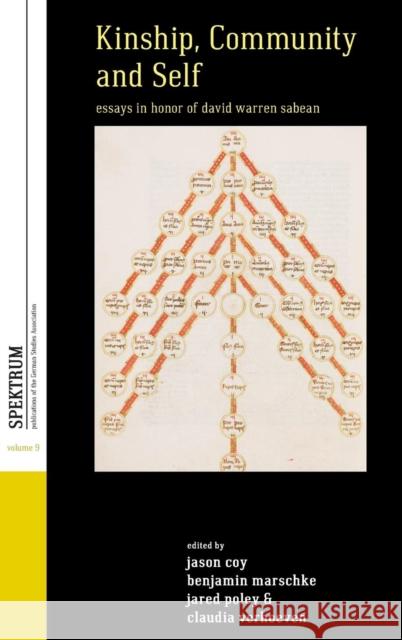Kinship, Community, and Self: Essays in Honor of David Warren Sabean » książka
Kinship, Community, and Self: Essays in Honor of David Warren Sabean
ISBN-13: 9781782384199 / Angielski / Twarda / 2014 / 316 str.
"This is a very fine collection of essays. The goal of this volume is clearly to showcase the diversity of the scholarly work that has been inspired by Sabean's approach to history, the kinds of questions he has asked of his sources, and his ability to penetrate to the heart of submerged or overlooked discourses and life-worlds." George Williamson, Florida State University David Warren Sabean was a pioneer and remains a foremost expert in the historical anthropological study of kinship, community, and selfhood in early modern and modern Europe. His career has helped to shape the discipline of history, and he has supervised dozens of graduate students and influenced countless other scholars. This book is a collection of wide-ranging (both temporally and geographically) essays that revolve around the prominent issues that have framed Sabean's work throughout his career: kinship, community, and self. The book features contributions by Sabean's former students, who contribute original research inspired by his scholarship, and essays written by major scholars who are his contemporaries, who provide historiographic essays on the scope of the volume, its major themes, and the impact of Sabean's scholarship on the discipline of history. Jason Coy is Associate Professor of History at the College of Charleston. He is the author of Strangers and Misfits: Banishment, Social Control, and Authority in Early Modern Germany (2008). Benjamin Marschke is Professor of History and Chair of the History Department at Humboldt State University. He is the author of Absolutely Pietist: Patronage, Factionalism, and State-Building in the Early Eighteenth-Century Prussian Army Chaplaincy (2005). Jared Poley is Associate Professor of History at Georgia State University. He is the author of Decolonization in Germany: Weimar Narratives of Colonial Loss and Foreign Occupation (2005). Claudia Verhoeven is Associate Professor of History at Cornell University. She is the author of The Odd Man Karakozov: Imperial Russia, Modernity, and the Birth of Terrorism (2009).
"This is a very fine collection of essays. The goal of this volume is clearly to showcase thediversity of the scholarly work that has been inspired by Sabeans approach to history, thekinds of questions he has asked of his sources, and his ability to penetrate to the heart ofsubmerged or overlooked discourses and life-worlds." George Williamson, Florida State UniversityDavid Warren Sabean was a pioneer and remains a foremost expert in the historical anthropological study of kinship, community, and selfhood in early modern and modern Europe. His career has helped to shape the discipline of history, and he has supervised dozens of graduate students and influenced countless other scholars. This book is a collection of wide-ranging (both temporally and geographically) essays that revolve around the prominent issues that have framed Sabeans work throughout his career: kinship, community, and self. The book features contributions by Sabeans former students, who contribute original research inspired by his scholarship, and essays written by major scholars who are his contemporaries, who provide historiographic essays on the scope of the volume, its major themes, and the impact of Sabeansscholarship on the discipline of history.Jason Coy is Associate Professor of History at the College of Charleston. He is the author ofStrangers and Misfits: Banishment, Social Control, and Authority in Early Modern Germany (2008).Benjamin Marschke is Professor of History and Chair of the History Department at HumboldtState University. He is the author of Absolutely Pietist: Patronage, Factionalism, and State-Building in the Early Eighteenth-Century Prussian Army Chaplaincy (2005).Jared Poley is Associate Professor of History at Georgia State University. He is the author ofDecolonization in Germany: Weimar Narratives of Colonial Loss and Foreign Occupation (2005).Claudia Verhoeven is Associate Professor of History at Cornell University. She is the author ofThe Odd Man Karakozov: Imperial Russia, Modernity, and the Birth of Terrorism (2009).











